
We kindly inform you that, as long as the subject affiliation of our 300.000+ articles is in progress, you might get unsufficient or no results on your third level or second level search. In this case, please broaden your search criteria.


The text illustrates the development of the comparative price level in the world, in the Eurozone, and I Bulgaria. The author comes to the conclusion, that the introduction of the euro in the year 2010 in Bulgaria could affect negative the developmentof the country.
More...
The present paper illustrates the views of the author about the cause for the current account deficit in Bulgaria. The usual public explanation of the problem here is that the current account deficit is a result of the low competitiveness of the country’s export. The author’s analyses shows that the main factor for the deficit is the inflow of the foreign investment and the growth of the foreign debts of the private non banking sector in Bulgaria. This conclusion could be of very high importance for a revisionof the fiscal policy in the country of the last years, because it gives valuable arguments against the practice of the budget surpluses.
More...
The paper displays the social-economical development of Bulgaria for the period 2000-2006, through the research of several macroeconomical indicators as GDP, unemployment, per capita income, inflation, economical growth and others. These indicators are analyzed on a nation level, by regions of planning and by different areas of economics. Adequate social-economical politics can be developed on the basis of the research.
More...
Overcoming the current social challenges are facing our country, more and more clearly stands out the importance of pursuance of an effective social policy.This article attempts to analyze the concepts of the three great representatives of economic theory- Smith, Marx and Keynes, drawing three different way to solve social problems at the root of which is the different ratio between the participation of the state and the market in providing the welfare of the public.The conclusion is that the construction of a successful social platform requires is not to adherence to a particular theory, but in marking a comprehensive framework of principles that preserve the advantages and overcome the shortcomings of the final options.And all of this is in accordance with the characteristics of rapidly transforming socio-economic reality.
More...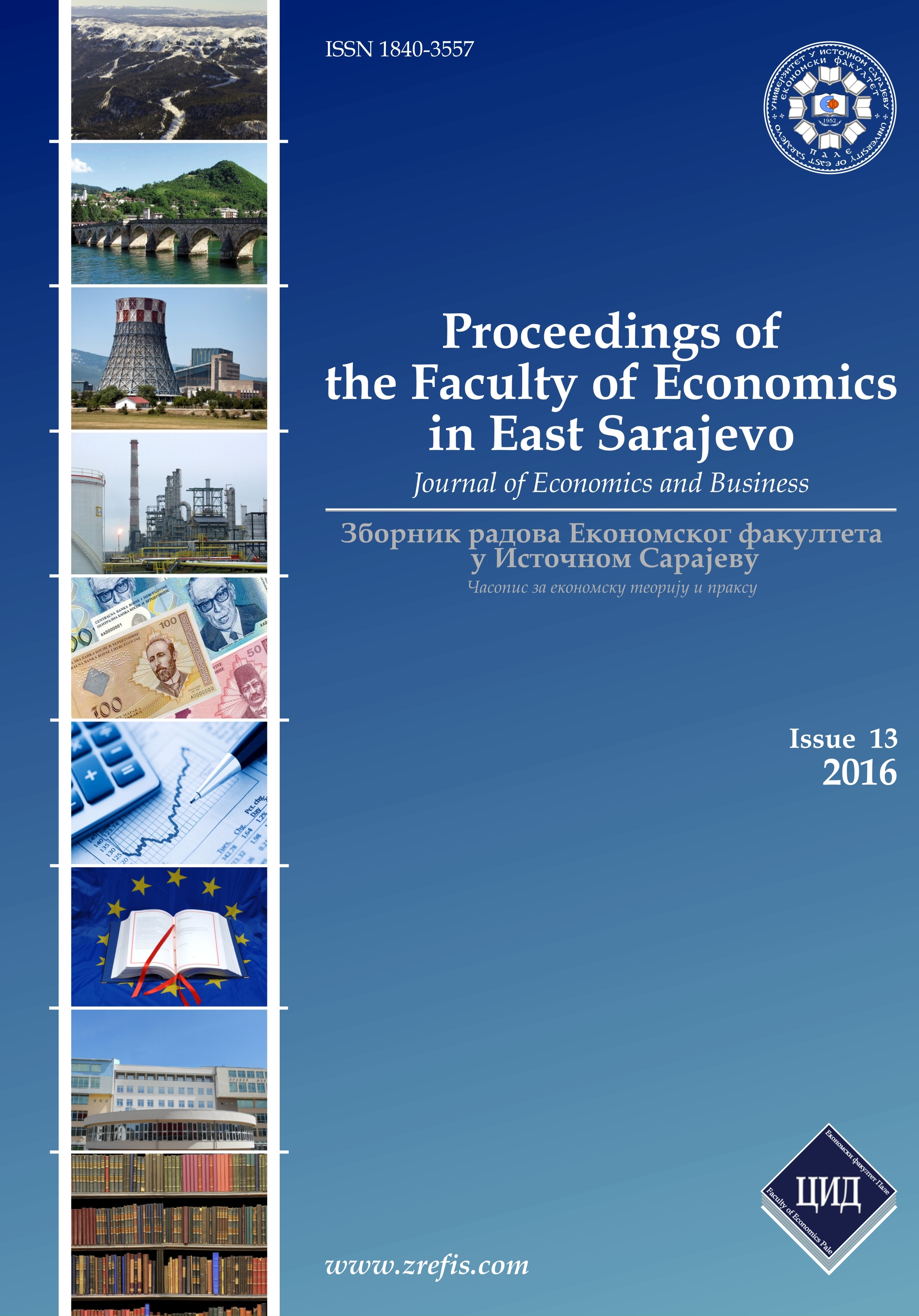
For the countries like Bosnia and Herzegovina, which are dependent of foreign trade because of their size and open economy, involvement in the process of regional cooperation and integration is a condition without which the further progress is not possible. Commitment of Bosnia and Herzegovina is to be a part of the Europan Union. A regional associating of countries in the region and making of free trade area such as CEFTA 2006, is creation of prerequisites for accomplishment of criteria which are imperative to accession of one country to the Europan Union. This agreement which establishes new and modern trade rules and defines questions of liberalization of services, investments, public procurement and intellectual properties, is meant to ensure for the signatory country to make better results in the foreign trade and attract direct foreign investment through its consistent implementation. The capibility of a country to maximize benefits which are the result of application of this agreement, represents a direct indicator of competence of the country, member of CEFTA, to participate in competition on the market of European Union.In order to confirm the main hypothesis that Bosnia and Herzegovina did not have huge benefits of CEFTA 2006 Agreement, the following scientific methods are used: analysis and synthesis, comparative method, classification method, description, stastistical, historic method, specialization, approving methods, deductive and inductive, compilation, observing, abstraction and concretization. The research goal is to determine and present the real result which comes out of this free trade zone and implications of exit of Croatia from CEFTA Agreement on economy of Bosnia and Herzegovina.
More...
The article analyzes the fiscal reforms in Ukraine and the OECD countries. It has been proved that the main areas which should undergo changes are the tax reform, regulatory reform and restructuring policies to encourage entrepreneurship, reform of social protection and social security, reform of social sphere constituents, administrative reform, reform of the army and law enforcement, administrative and territorial reform. According to the analysis results, there has been drawn the conclusion about the need to introduce in Ukraine the successful experience of the OECD countries in implementing budget reforms.
More...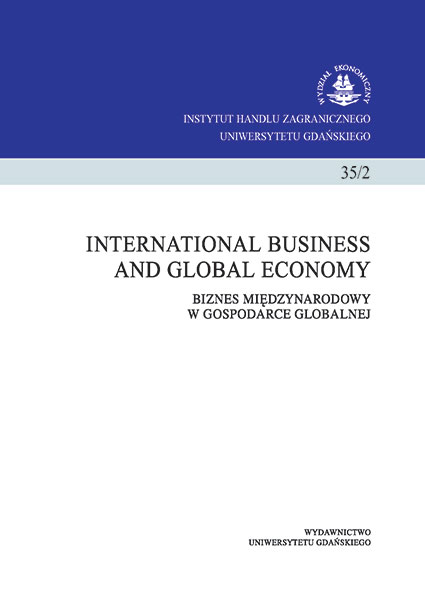
This article describes the intra-African FDI in the period of 2001–2013. Its main purpose is to identify some specific patterns of this investment and compare them with FDI models of firms in non- African countries. The analysis includes the value of FDI, as well as its geographical and branch distribution.The research reveals that intra-regional capital flows have started to play a greater role in Africa’s FDI inflows. The geographical and branch structure of the projects of African firms differs significantly from that of firms located in non-African countries. Africa’s FDI is mainly concentrated in the western and eastern regions of the continent, in the service sector and manufacturing.
More...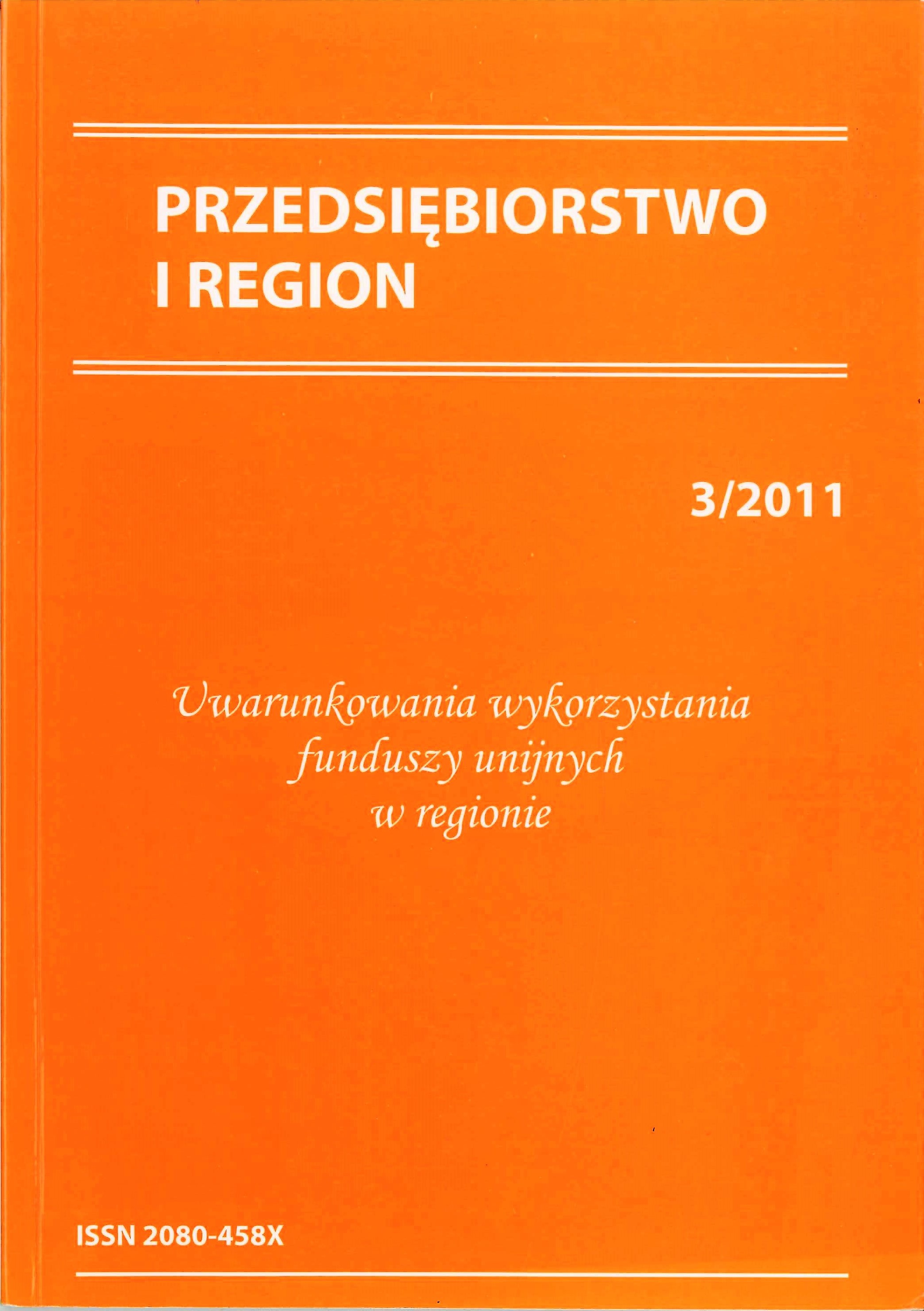
Artykuł jest poświęcony roli partnerstwa strategicznego, w aspekcie perspektyw współpracy transgranicznej pomiędzy Ukrainą a Polską. Partnerstwo postrzegane jest jako mocne narzędzie rozwoju regionalnego w systemie stosunków dwustronnych. Wykazano przykłady, które przyczyniły się do intensyfikacji transgranicznej współpracy polsko-ukraińskiej. Jako obszar priorytetowy zaprezentowano współpracę w zakresie edukacji i nauki pomiędzy instytucjami szkolnictwa wyższego. Na podstawie analizy bieżących problemów współpracy transgranicznej zaproponowano działania mające na celu poprawę współpracy.
More...
Location processes are constitutive for the formation of economic landscape. Largest enterprises represent one of the most important units of territorial economies. Their role is palpable mainly in the sphere of employment, technological level, value chains, competition as well as overall economic power. It is far from surprising that the weight of enterprise headquarters is higher than that of their affiliates. Therefore, the main objective of our article is to analyze and assess the development of spatial organization of one hundred largest enterprise head offices in the Czech Republic from both quantitative and qualitative perspectives. Due to data limitations, size of the enterprise is measured by its turnover. Spatial distribution of one hundred largest Czech enterprises and its development over time represent the focal point of our evaluation from quantitative point of view. The analysis was based upon annually published top 100 databases. Qualitative assessment is underpinned by the results of the questionnaire, which was focused on particular location factors accentuated by largest enterprises. Consistency analysis and exploratory factor analysis provide us with useful instrument for the evaluation of qualitative dimension of the issue and help us to conceptualize location preferences of largest enterprises in the country.
More...
In this paper, we use firm-level data to investigate how different host country characteristics affect the decision of Spanish multinational firms to locate in developing and transition countries, and whether these determinants change when looking at manufacturing or services firms. As a methodological novelty, we estimate both standard conditional logit models as well as other discrete choice models that allow us to account for the possibility that firms perceive some alternative destinations as being more similar (nested and mixed logit models). A better understanding of the relevance of local factors that determine the competitiveness of these economies in providing multinational firms with location advantages can guide policymakers in their attempt to attract foreign capital flows. This, however, has not been previously addressed by the empirical literature at a firm level and across sectors. Our results suggest that Spanish investments in developing and transition economies are mainly driven by market-seeking factors. They also confirm the relevance of the business and financial climate in the location decision of multinational firms. Finally, the estimations reveal differences between manufacturing and services foreign direct investments in several local factors, such as the agglomeration effects, skilled labour and financial risk.
More...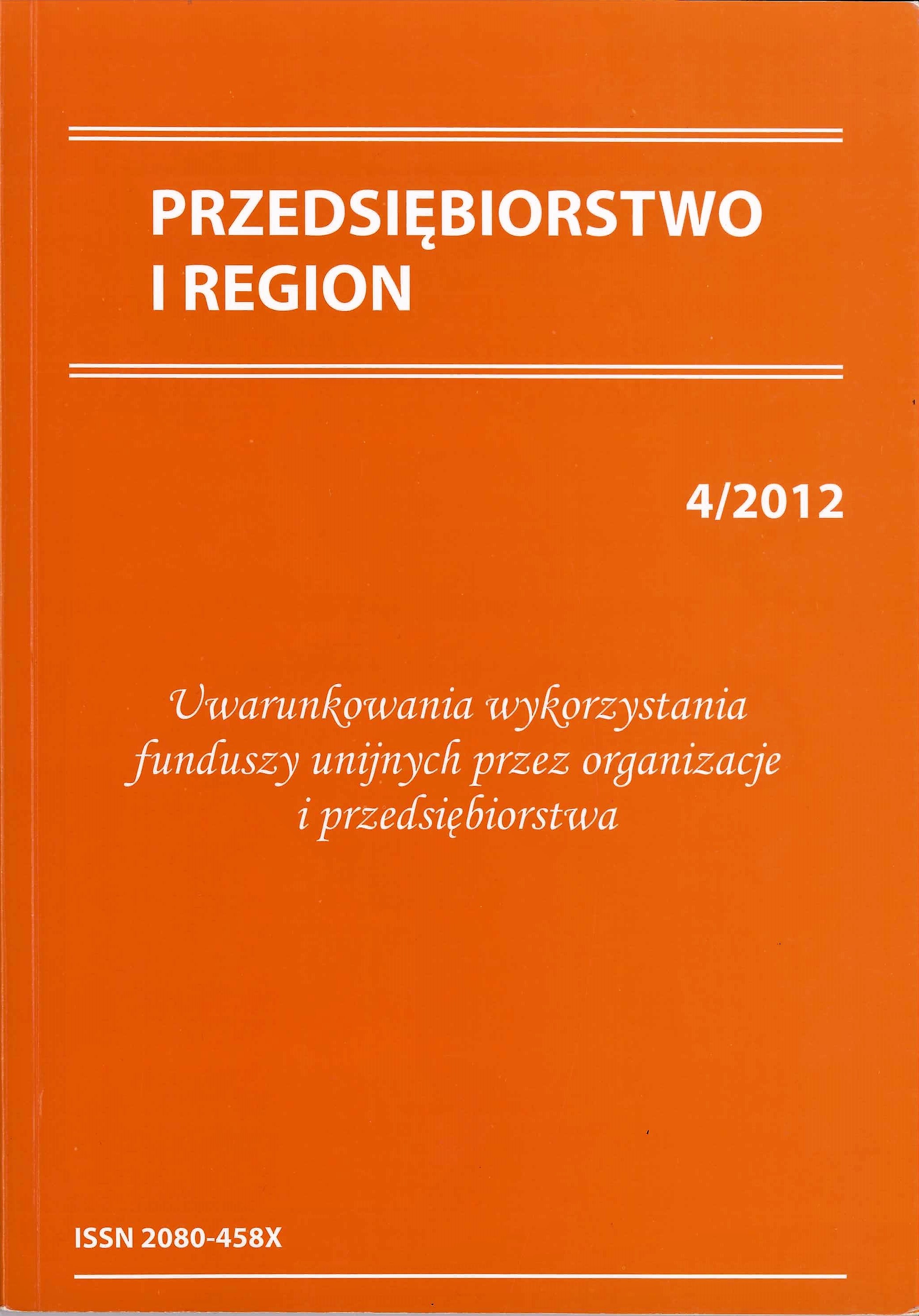
The aim of the article is to show the accessible structural funds in Podkarpackie for financing the innovative activity as well as to point at the barriers and the benefits in connection with making use of them.The article takes up the issue of significance of making use of the structural funds in raising the competitiveness and the innovativeness of the Podkarpackie Region. It contains the discussion on the sources of financing the innovative solutions, furthermore in detail are described the accessible in the Podkarpackie structural funds as the main source of financing the innovations in period 2007-2013, and access to them gives the companies opportunity of implementation of the innovative ventures.
More...
The effects of FDI inflows to the region are the subject of many theoretical considerations, both quantitative and qualitative. In the context of shaping the competitiveness of the region receiving capital effects can be both positive and negative. Whether the positive effects predominate in the region over the negative results depends on the possibilities inherent in the region. SubcarpathianVoivodship, despite the weak notes in the rankings of investment attractiveness has its economic profile. It is the aerospace industry, but also electrical engineering, biotechnology, IT and chemical industries. The region has a large concentration of companies especially the aviation industry, research centers and developed educational and training facilities.
More...
The article presents the changes in size and structure of the local labour markets in medium-sized towns of the Podkarpackie Province in the years 1995–2015. The group of midsize towns is represented by nine cities with a population between 20–100 thousand inhabitants. Together, the population of these towns represents over a half of the urban population in the region of Podkarpackie. In this context, the role of medium towns – as cores of the local labour markets – is often overlooked. The recent situation of examined towns – in terms of the size of labour markets – has deteriorated compare to the 1995. Over the past two decades, the total number of employees decreased by more than 12%. The changes concerns also the employment structure by gender and economic sectors (especially the development of the service sector).
More...
The article contains a comparative analysis of tax wedge levels in OECD countries – in average terms and for different household types. Its main purpose is to identify major trends in the wages taxation in OECD, with special regard to Personal Income Tax. The analysis is carried in the context of two non-fiscal function of taxation – the stimulating and the redistributive one. The level of the tax wedge in OECD countries is significant. That may be harmful to the economy. However, the level can be perceived as the price of the extensive social protection. PIT constitutes a significant part of the tax wedge, although its role is diversified among OECD. What’s more, PIT and social security contributions, which co-exist in the tax wedge, have an alternative and supplementary character. Personal Income Tax determines the progressive structure of the tax wedge, as well as it contributes to the realisation of pro-family purposes.
More...
New pragmatism is an original, paradigmatic and heterodox theoretical concept within the feld of economic science, which attempts to address current civilizational challenges and factors that will determine the future functioning of economic systems. It strives to advance economic theory in a direction that allows a more in-depth and accurate cognition of the economic reality than is possible through the prism of orthodox theories. At the same time, it provides an outline of a theory that is strongly applicative in nature and immanently combines scientifc cognition (positive perspective) and the formulation of guidelines and practical recommendations (normative perspective). This, indeed, forms the foundation on which to build the economic policy and strategy for development, as they both determine the world’s civilizational advancement.
More...
New study accords with previous estimates, saying off-the-books income remains stubbornly high.
More...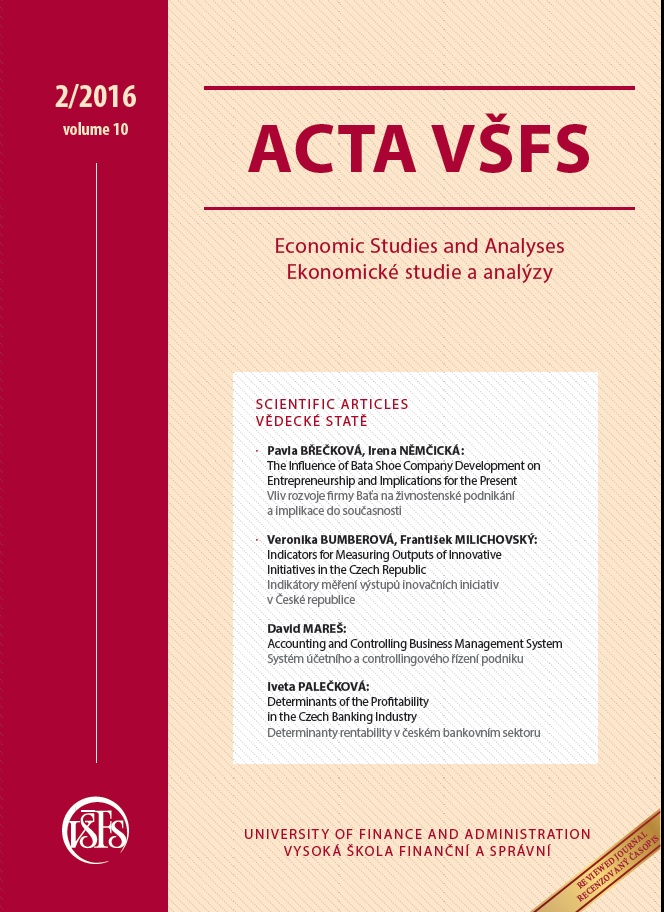
The aim of this paper is to examine the influence of the expansion of Bata Shoe Company on entrepreneurship in the period of the First Czechoslovak Republic1 and to find a parallel with the current problems of entrepreneurship in the Czech Republic after almost a century. The partial aim was to trace the impact of the significantly development-oriented strategy of Bata Shoe Company to a steep decline in numbers of entrepreneurs in the shoemaking field in the stated period of 1920s and 1930s, and to realistically describe business environment of that time with the emphasis on entrepreneurship. Another partial goal was to find the above mentioned parallel with present and to identify any implications for the current situation and development of entrepreneurship in this country in general. Entrepreneurship comes back to centre of academic interest and is highly topical these days as one of the pillars of regional sustainability, which is, however, on decline. Concerning the methodology, the research is based on our own examination and processing of unique archive of statistical, descriptive and legislation resources from 1920s and 1930s. In addition, it is based on the analysis of the current entrepreneurship in CZE with an emphasis on artisan trades, as also other data and their comparison from surveys and analyses made by authors in the past were used. The results of the research proved that growth and development strategy of Bata Shoe Company had only a limited impact on the steep decline of entrepreneurship in the field of shoemaking, while among other a technological progress (and industrialisation) played an important role. In order to have higher validation of the result, the archive data were also compared with fields that did not undergo such dramatic technology change. The article also presents a number of parallels with the current entrepreneurship situation.
More...
This paper focuses on the identification of a set of KPIs that are used in Czech companies to evaluate the outputs of innovative initiatives to maintain and improve organizational performance as a goal of implementation of innovations. The empirical evidence is based on a quantitative data, gathered through an email by structured self-assessment tool (check-list) which yielded 194 qualified responses. For the analysis of gained data there was used factor analysis within evaluation by factorial loadings. Results of the factor analysis provide possible groups according their similarity of variability and create new variables. Observed indexes were verified by coefficient Cronbach’s alpha. Findings of the paper serve up suggestions, that especially financial performance indicators are statistical significant in market area and operation management.
More...
The main purpose of this article is to outline the current challenges of beer industry in Lithuania and provide suggestions for future development of organizations in this industry, by focusing on diversification strategy and social responsibility. The main challenges of Lithuanian beer industry are related to finding ways of future development in a constantly contracting market, as well as to find a competitive strategy of market penetration. In connection of these challenges, product differentiation creates new benefits for the consumers. However this strategy proves itself not being sufficient to reach the desired goals. Diversification of portfolio, being more risky, gives opportunity to target new customer groups and increase market presence. However, both strategies are less effective without changing the culture of drinking and consumer perceptions of beer. These issues will be addressed through the lenses of social responsibility, by emphasizing the promotion of responsible alcohol consumption and responsible behaviour of beer industry. As a result, the customers have to be ready to pay higher price for new products and develop a more responsible culture of beer consumption. To overcome outlined challenges, organizations in Lithuanian beer industry, must rethink their existing strategies and operations. Based on proposed future directions, the paper provides suggestions for business practices, how to implement differentiation strategy and actions in order to increase the level of social responsibility of various stakeholders.
More...